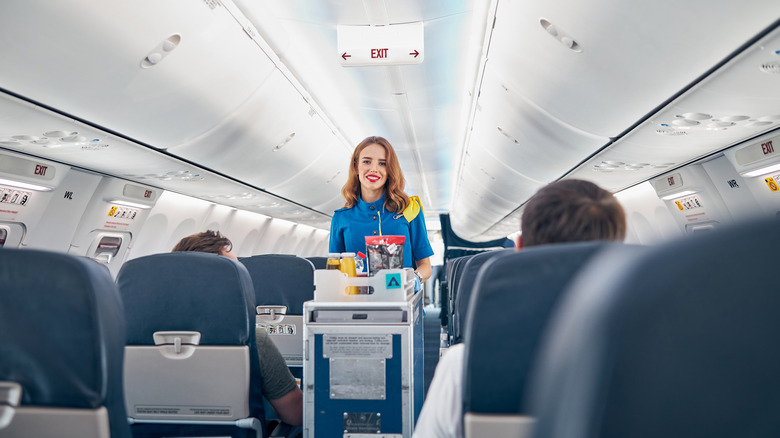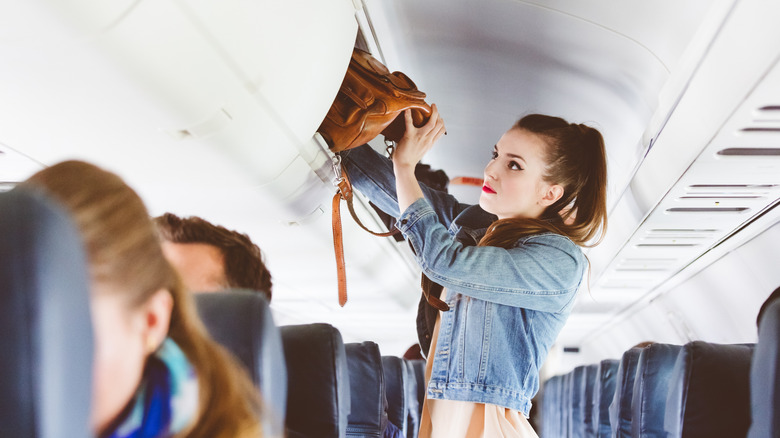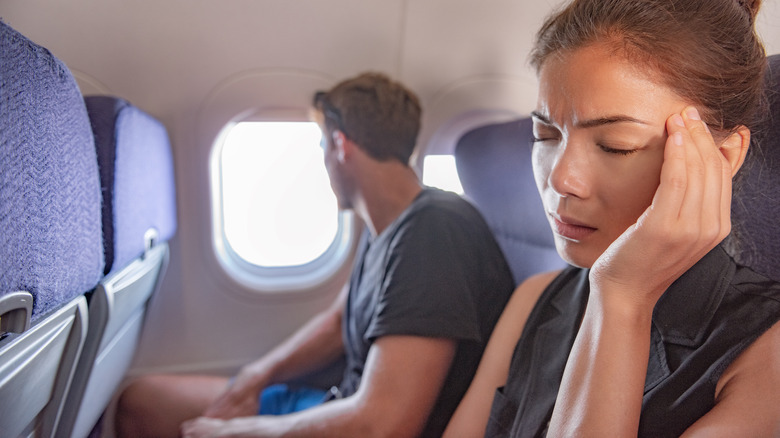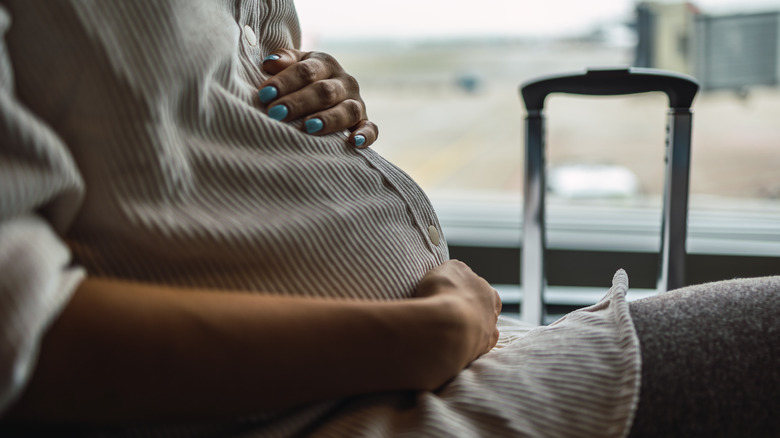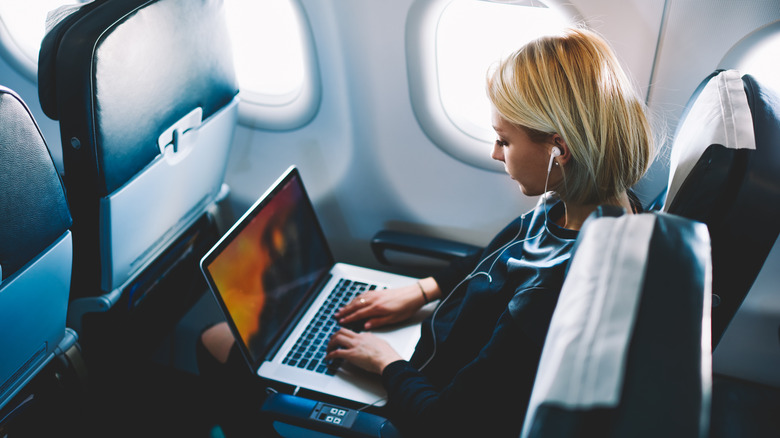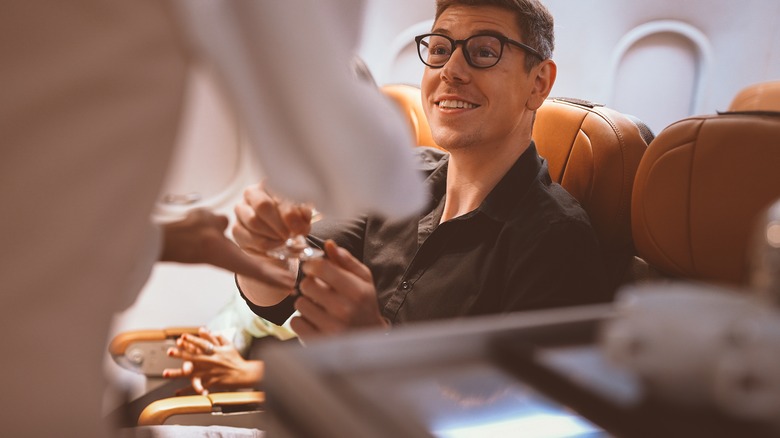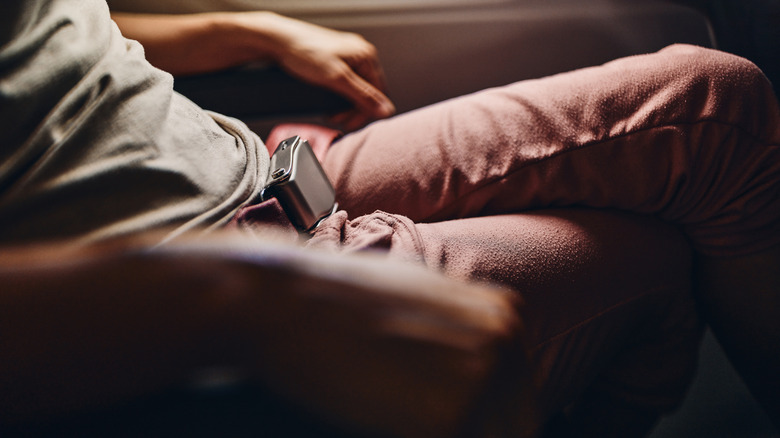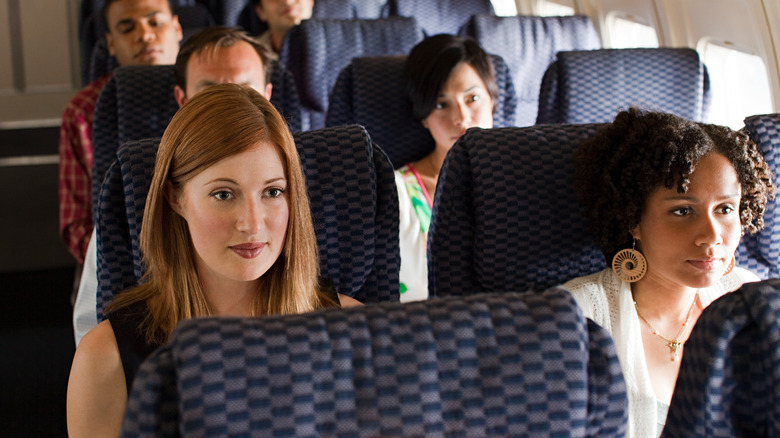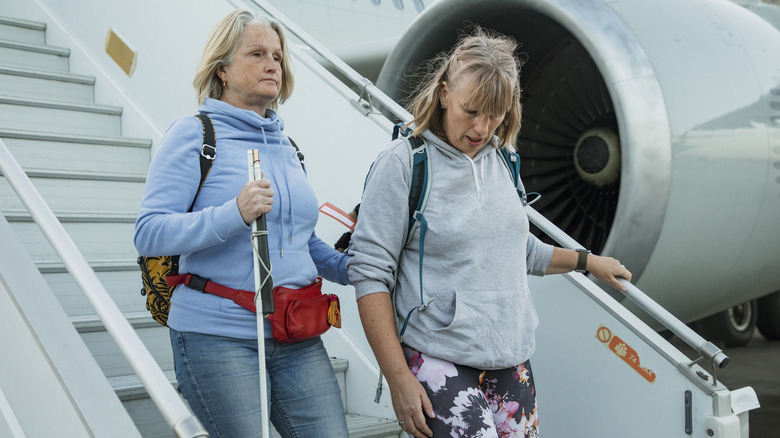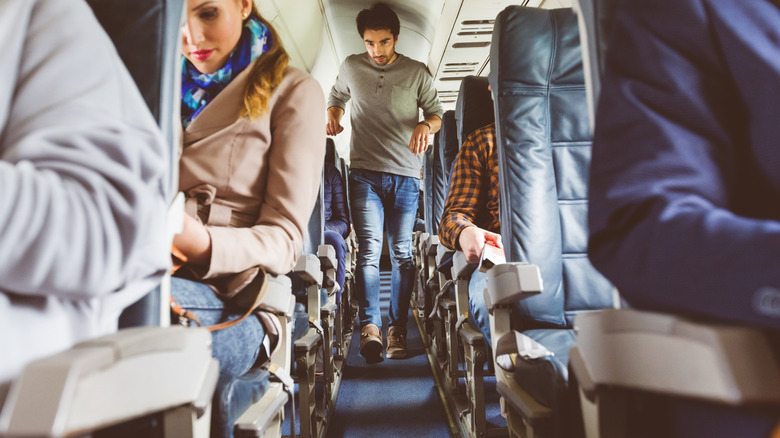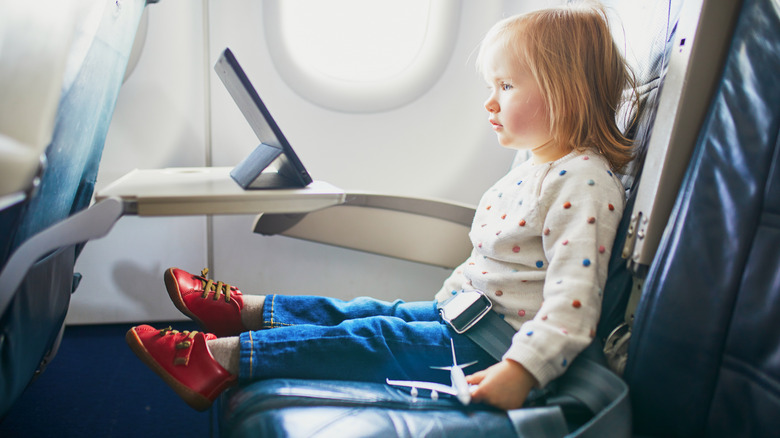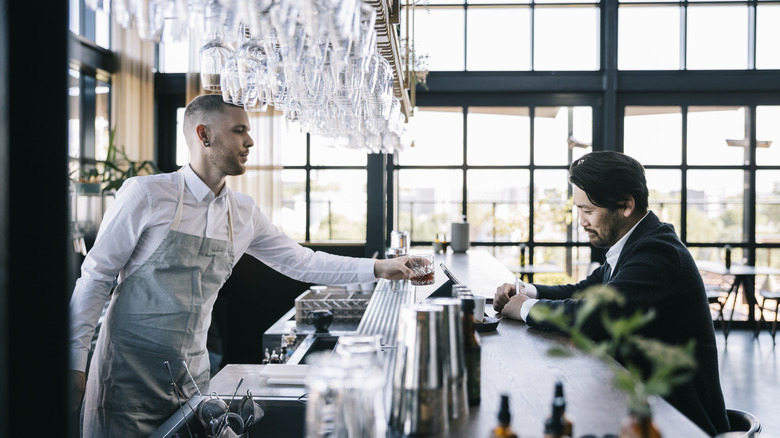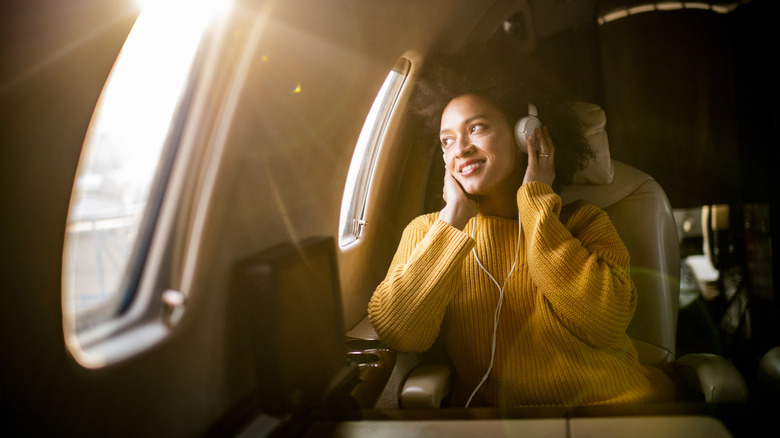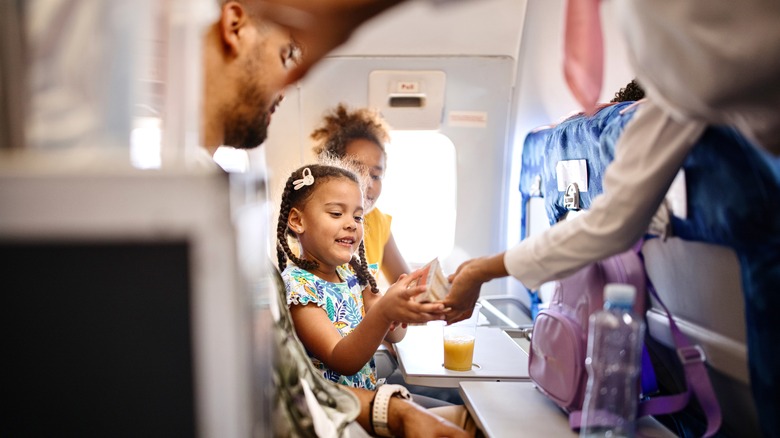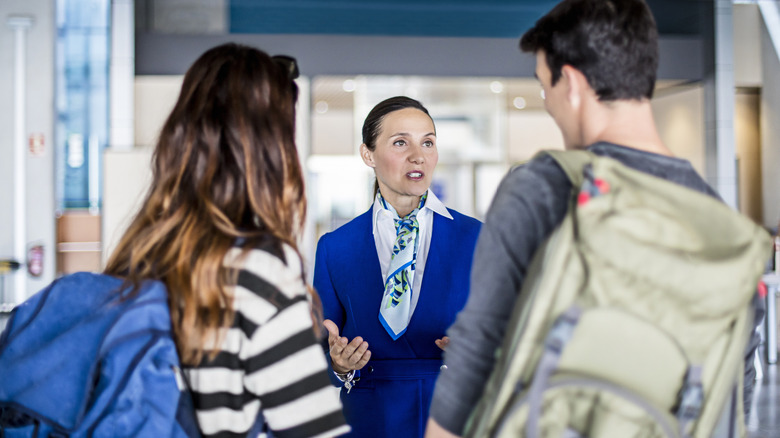Things Flight Attendants Notice About You When You Board A Plane
Flight attendants play a big role in the travel experience, and their duties are more important than you may believe. You know them as the kind, smiling attendants that point you to your seat and pass out beverages, but the airfaring crew are actually heavily trained for various survival scenarios. This training includes taking notice of everyone who passes through their galley, and you'll be surprised at just what they're looking for when they greet you with that welcoming smile.
You'd be amazed at what an airplane personnel can discern about you just from a glance as you board your flight. Flight attendants are basically the guardians of a flight and are trained to employ every resource at their disposal to keep the journey running smoothly. From what you're wearing to how you carry yourself when finding your seat, the flight attendants on board are taking stock of anything that may help keep you and the other passengers safe and comfortable throughout the flight. While you shouldn't consider them to be judgments, here are some things that the flight crew will notice about you and your fellow travelers while boarding and preparing for take-off.
Your baggage
Without fail, there will always be passengers who think they can get one over on the airline and pack a bigger carry-on than permitted. While you may get lucky and make it through check-in and security with a bag that is not standard size, flight attendants will know immediately if your baggage is going to cause them issues.
The perfectly positioned crew member who welcomes you onto the plane isn't just there for sentimental value — they're there to move things along and get passengers seated in a timely manner. Flights are on a tightly controlled and strategic schedule. Flight attendants help make takeoff times by directing passengers to their seats and, in the case of these baggage renegades, spotting carry-ons that will not fit in the overhead bins.
Flight crew have seen thousands of bags and know at a glance whether or not your bag will indeed allow the overhead bin to latch for a safe takeoff. They have years of experience in politely convincing even the most stubborn passenger that their luggage will not fit overhead. If you think you can get away with an extra half-inch, you're likely in for a gate check once you cross paths with your plane's flight attendants.
Your health
Even though traveling while sick really isn't recommended, sometimes there's no avoiding it. Whether you have come down with a last-minute cold or have a need to fly come up while you're feeling unwell, know that you may notice your flight attendants shooting you extra glances during your flight.
Air pressure and altitude can have an effect on healthy passengers, but they can make an already sick passenger significantly sicker. The crew wants to avoid a medical emergency at all costs, especially mid-flight, so once the door closes they will pay special attention to the passengers who look under the weather.
It's not abnormal — especially post-pandemic — to see passengers on a flight wearing medical masks. Flight attendants may make note of these passengers as potentially feeling sick, but they will also look for swollen or red eyes, sweating, or sweating when scanning guests. If any signs of sickness are present, the crew will keep an eye on the passenger to make sure their situation does not worsen throughout the flight.
How far along you are
Is there a doctor in the house? Nobody wants to give birth 30 thousand feet in the air, and flight attendants don't particularly want to add "midwife" to their long list of skills. If you are pregnant and showing, they will likely notice your baby bump and be able to pinpoint how far along you are.
All expectant parents show pregnancy differently, of course, but flight attendants have plenty of practice in gauging how close you are to full term. If they suspect you may be past their flight requirements for pregnancy, they may ask you to confirm or even prove your status.
Flying is relatively safe for pregnancy and parents-to-be can travel on domestic flights up to around 36 weeks. Any later than this runs the very real chance of natural labor occurring mid-flight, which is not an ideal situation on an airplane. Airlines may even require proof of your due date and a clean bill of health from your doctor in order to fly, especially if you are past the second trimester.
What you do for a living
No, really, is anyone here a doctor? Flight attendants are always on the lookout for passengers with special skills that could be of use in an emergency situation. Medical professionals, first responders, and fellow airline employees could all act as an extra set of hands if something goes wrong. Medical emergencies, unruly passengers, or even an impending crash are all situations in which a flight attendant could need to pull help from passengers.
Even if you are not wearing your badge and scrubs or have your pilot wings on display, airline crew may already have clocked you for being a helpful resource if needed. They may notice, for example, you reading a medical journal or a professional magazine. Flight attendants may also find clues about what you do on your baggage or carry-on items, like a title monogrammed on your bag or even a caduceus sticker on your laptop.
Whether you're nice
A flight attendant's most obvious job is to be nice to you, and they're usually a bright spot on an otherwise pretty bland flight. Their smiles light up the plane and they try to give each passenger at least a small moment of their time. Not everyone shares in their cheery presence, though, and a bad attitude is one of the first things a flight attendant will notice.
Not only will the crew members notice a less-than-friendly passenger, but the lack of kindness is actually a pretty big pet peeve of flight attendants. Neglecting to return a smile or hello will instantly put you in last place for the title of "Best Passenger" and ignoring the staff altogether is a surefire way to get your flight attendant to hate you. While we totally get that not everyone is over the moon about plane travel, it doesn't hurt to at least throw a smile their way.
If you're nervous
Fear of flying is common, even though your chances of dying in a plane crash are miniscule. Flight attendants are pros at flying in an airplane and have all the secrets of how to combat the anxiety that comes with hurtling through the air in what is essentially a fortified aluminum can. They've seen plenty of nervous passengers come and make it off the plane perfectly safe and intact, and you'll be one too.
If a flight attendant notices someone who is nervous, they could approach them in one of two ways. If they believe or are made aware that the person is afraid of flying, chances are they will show that passenger some extra love throughout the flight. On the other hand, nervousness can be a sign of something more nefarious at play, and a flight attendant will monitor the situation from afar. Both of these situations can be dangerous, though, as panic attacks are difficult to navigate while in the sky and have the potential to create an unsafe environment for other passengers.
If you're not making eye contact
Flight attendants are a kind of wolf in sheep's clothing — they're very nice, but always watching. While they are all smiles with their greetings, they're taking notice of anyone who may be acting abnormally. Passengers who won't meet a flight attendant's eye when speaking, look away quickly, or are vague and shifty when asked a question pull up some major red flags.
Of course, it's entirely possible that individuals who fit this description are having a bad day, are scared of flying, or are simply uncomfortable looking people in the eye. Other times, though, it could be something more serious. Either way, if a flight attendant feels as though a passenger is being shifty, they will watch that person throughout the flight to make sure they are not up to something that would put any of the passengers or the flight at risk.
If you have a disability
Flight attendants care about the safety of all passengers, so they will scan guests for any disabilities that may hinder them in an emergency. Passengers who need extra time and help to board are typically boarded first, which makes it pretty easy for crew members to spot. However, there may be another reason to look for smaller injuries, temporary disabilities, casts, or medical conditions in guests who are boarding.
Passengers who are wearing a cast or sling would be at a disadvantage if they find themselves needing to use their injured body part. They also are likely disqualified from sitting in an exit row, as these passengers have the added responsibility of operating the emergency exit door. By federal law, the people in these seats need to be able to function without assistance to open the heavy door. Knowing which passengers may require additional support and where they are located is important in the event of an emergency.
Your level of physicality
On the other hand, flight attendants also look for guests who look strong and fit to pinpoint who may be able to help in an emergency. It's not uncommon for flight attendants to either ask for volunteers or pick out individuals they think would be good for the exit row seat.
In case of an emergency, whoever sits in the exit row is responsible for opening the emergency exit door, which requires pretty much full dexterity and range of motion. Since the exit row seats come with a bit more legroom, they may scope out a capable-looking, extra-tall passenger to give them a little reprieve from the cramped middle seats.
As passengers file into the plane for boarding, flight attendants may also note where stronger-looking guests are sitting. While emergencies are rare, it is good to know where you can look to enlist help when you need sheer physical strength — whether that's during an evacuation or subduing an unruly passenger.
Your age
Flight attendants will also notice the elderly and very young when greeting passengers. This is specifically true when they are traveling by themselves. A lot of airlines have programs in place that allow children and elderly people to travel without family or friends to help them along the way. Instead, airline staff make sure they are where they need to be.
While the crew should be well aware of any unaccompanied minors and seniors on their flight before boarding, they will still take the time to really connect once they are on the plane. Throughout the flight, staff will pay them extra attention and check in on them regularly, then help them along their way once the plane lands.
Children and seniors not in a program will still be noticed by flight attendants, as they are two vulnerable groups during an emergency. Staff will note their locations in case they need to help them get to safety.
Whether you're intoxicated
If there is one thing that flight attendants notice right off the bat, it is if you have had one too many drinks at the bar prior to boarding. They can see it in your movements, smell it on your breath, and hear it in the slurring of your words. If you are deemed too intoxicated at boarding, the crew can absolutely deny you entrance into the flight.
Not only do you run the chance of getting sick on the plane, but drinking to excess could potentially put all the other passengers at risk. There is also the comfort of the rest of the plane to think about, as all sober people know that having one intoxicated person in the mix is a recipe for disaster. Flight attendants have no idea if they will have to handle a belligerent drunk person or a happy one. This unpredictable situation naturally puts the entire crew on guard, so it may be best to leave that last airport drink on the bar before heading to the gate.
What you're wearing
Another reason a flight attendant may be looking at you from head to toe is your outfit. The clothes on your back can tell the crew a lot about yourself, including your effectiveness at survival. The flight crew will notice everything from your heels to your layers, as well as anything else that can impair a hasty emergency exit if needed.
Restrictive clothing is generally a no-no for planes, as it can make the experience a lot more uncomfortable. Swelling and bloating does occur when people fly, so form-fitting clothing becomes tighter than ever before. Wearing comfortable clothes and shoes on the plane will ensure you are both comfortable and able to jump up and act (on the off chance there is an emergency).
Staff will also be looking for any outfits that go against their guidelines. While not many airlines have full-out dress codes anymore, you still shouldn't show up in clothing that's too revealing. In fact, people have been kicked off of flights for wearing crop tops and similar styles.
Who you are traveling with
Families with small children should never be separated on a plane, but it actually happens quite often. A lot of airlines require you to pay extra to choose your seats. This means that even though you buy the seats at the same time, your family's seats are likely scattered throughout the plane – unless you pay more.
When flight attendants see you coming through to board with toddlers and young children, they note the seats listed on your ticket. Though they can not guarantee a seat change for your family, they will try to pull together seats for you to sit together. If the flight isn't full, this is an easier feat. Full flights require other decent humans to swap seats, something not everyone is willing to do. If you want to be certain you are sitting with your family, book seats together. If you are unable to do that, know you do have a flight attendant in your corner who will attempt to keep families together.
How you're interacting with other passengers
Traveling is stressful and tensions can get high when getting settled on a plane. While flight attendants are helping direct passengers to their assigned seats, they are also scanning the cabin for any interactions that seem out of place. Whether it be a dispute over whose bag is going where in the overhead bins or who is sitting in whose seat, disputes are not unheard of when boarding a plane.
Flight attendants want to put an end to these altercations as soon as they start, as they can escalate quickly and cause an unsafe environment for anyone in the area. Passengers who are busy arguing in the aisle cause a backup in boarders, as no one can reach their seat. Cabin crew are trained to navigate agitated travelers and the faster they are able to identify a problem, the easier it is to get everyone back on track for a calm flight.
Contraband
Most passengers try hard to adhere to airline guidelines for fear that a deviation will rock the boat of an already shaky journey. There are some, though, who will still try to sneak forbidden items onto a plane. This doesn't usually work out for the smugglers, as flight attendants are pretty good about spotting the things that shouldn't be there. The crew pays close attention to people they might suspect of illegal behavior. That means keeping an eye out for people trying to transport contraband like exotic plants, foods, or even their pets in carry-ons, handbags, or even purses.
Passengers sneaking their own alcohol onto the plane is another thing the crew looks for, as well as people making trips to the restroom just to vape. For the most part, smuggling isn't worth the high risk of getting caught and putting the flight attendants in the middle of a smuggling operation.
